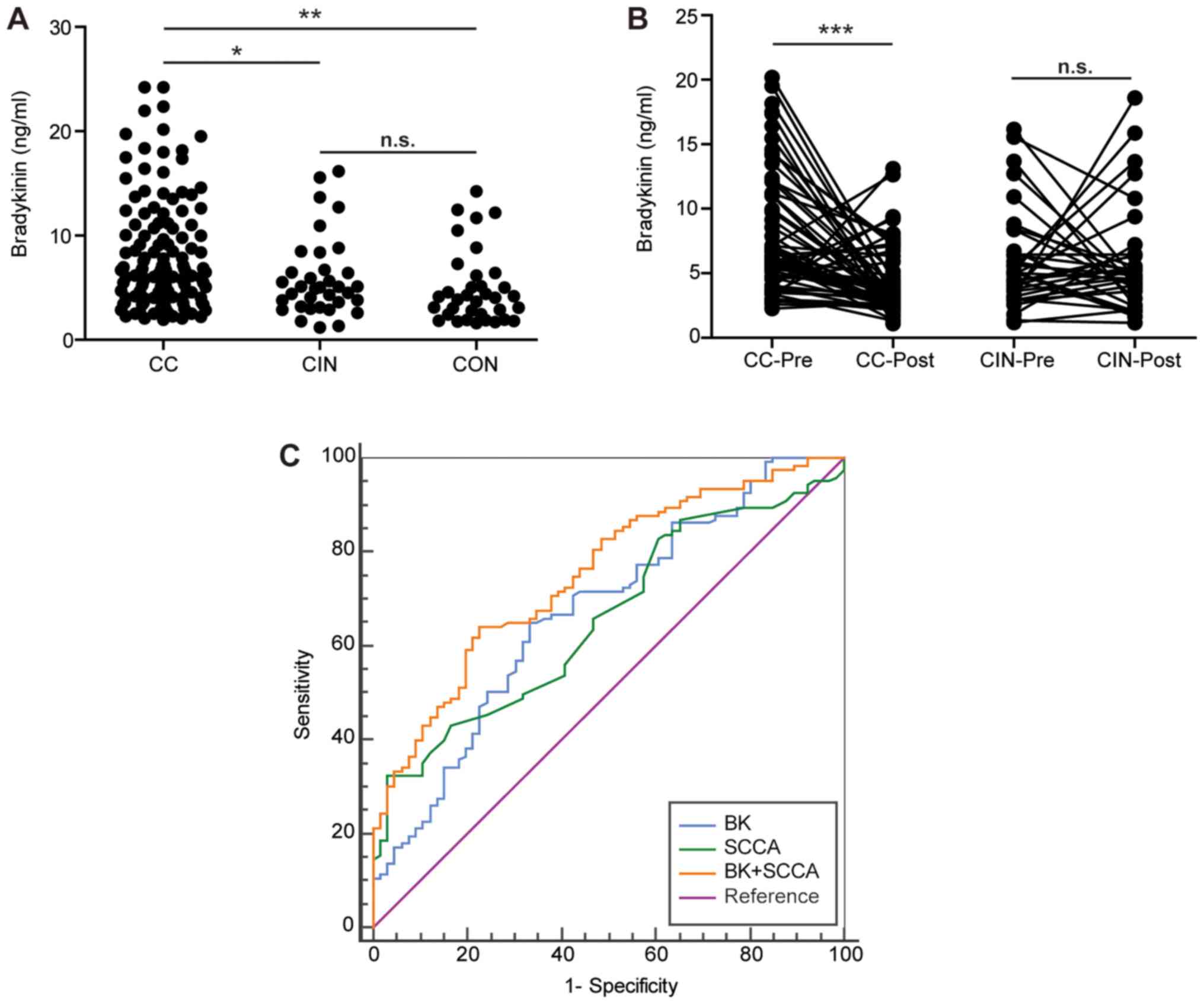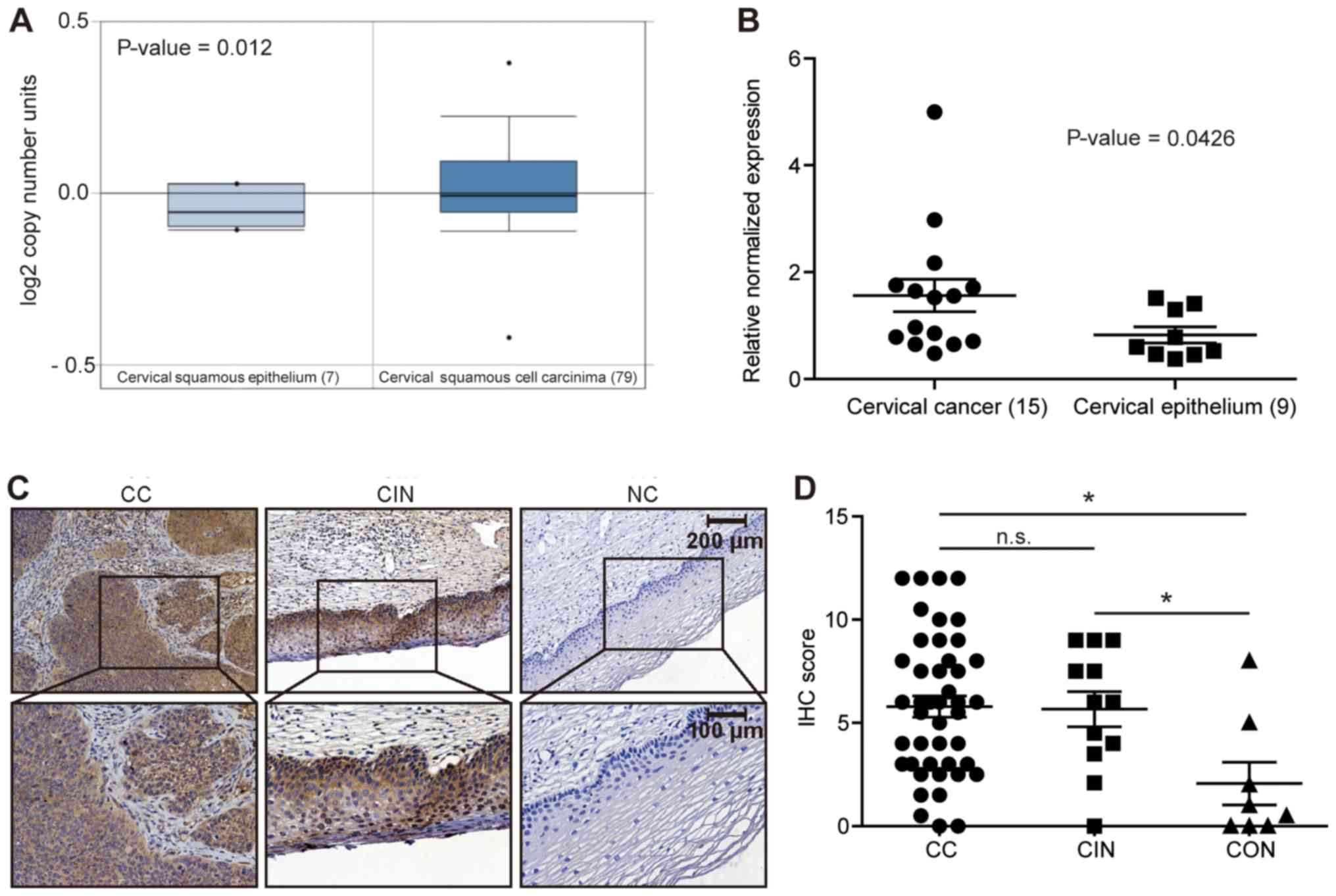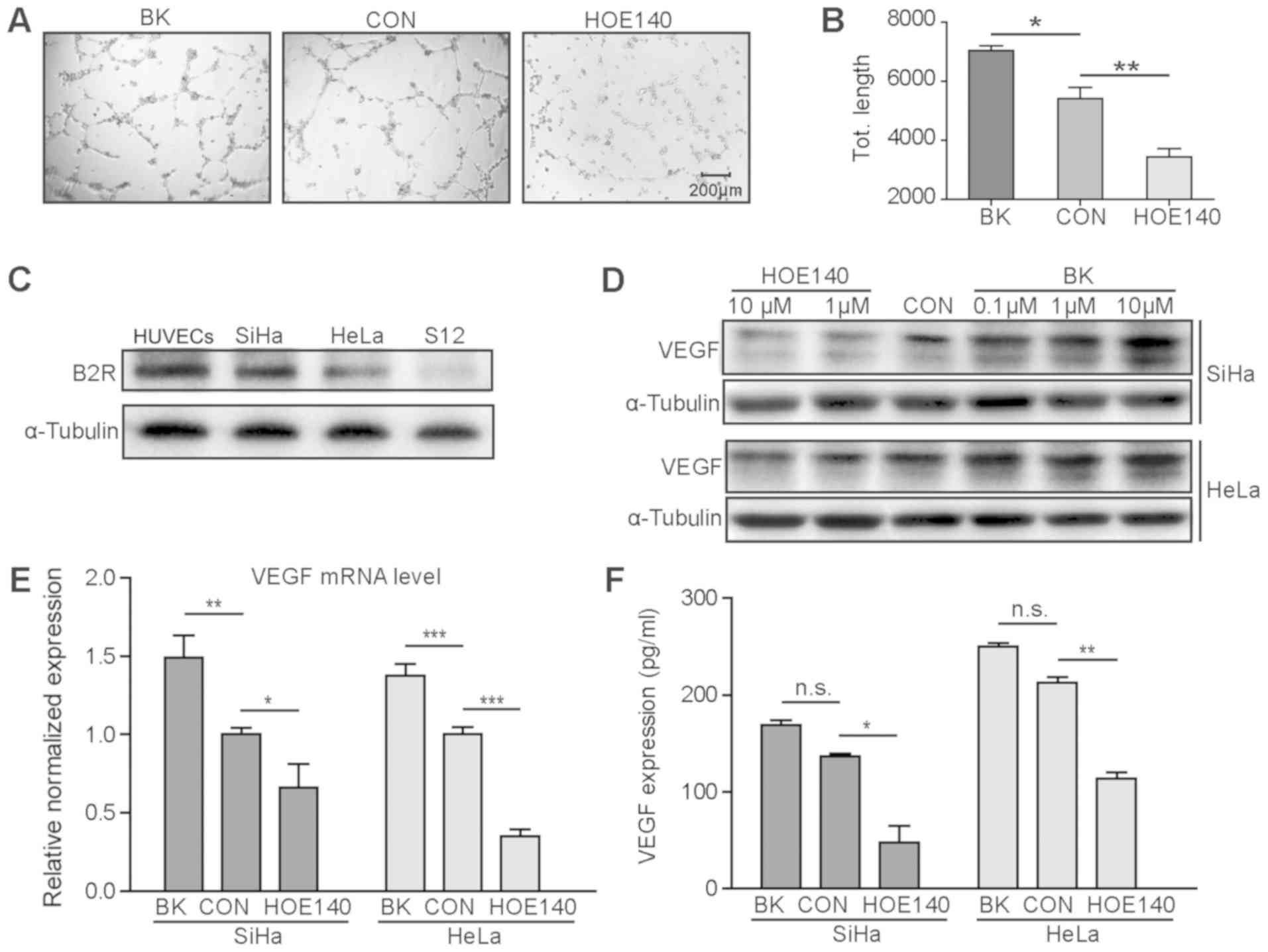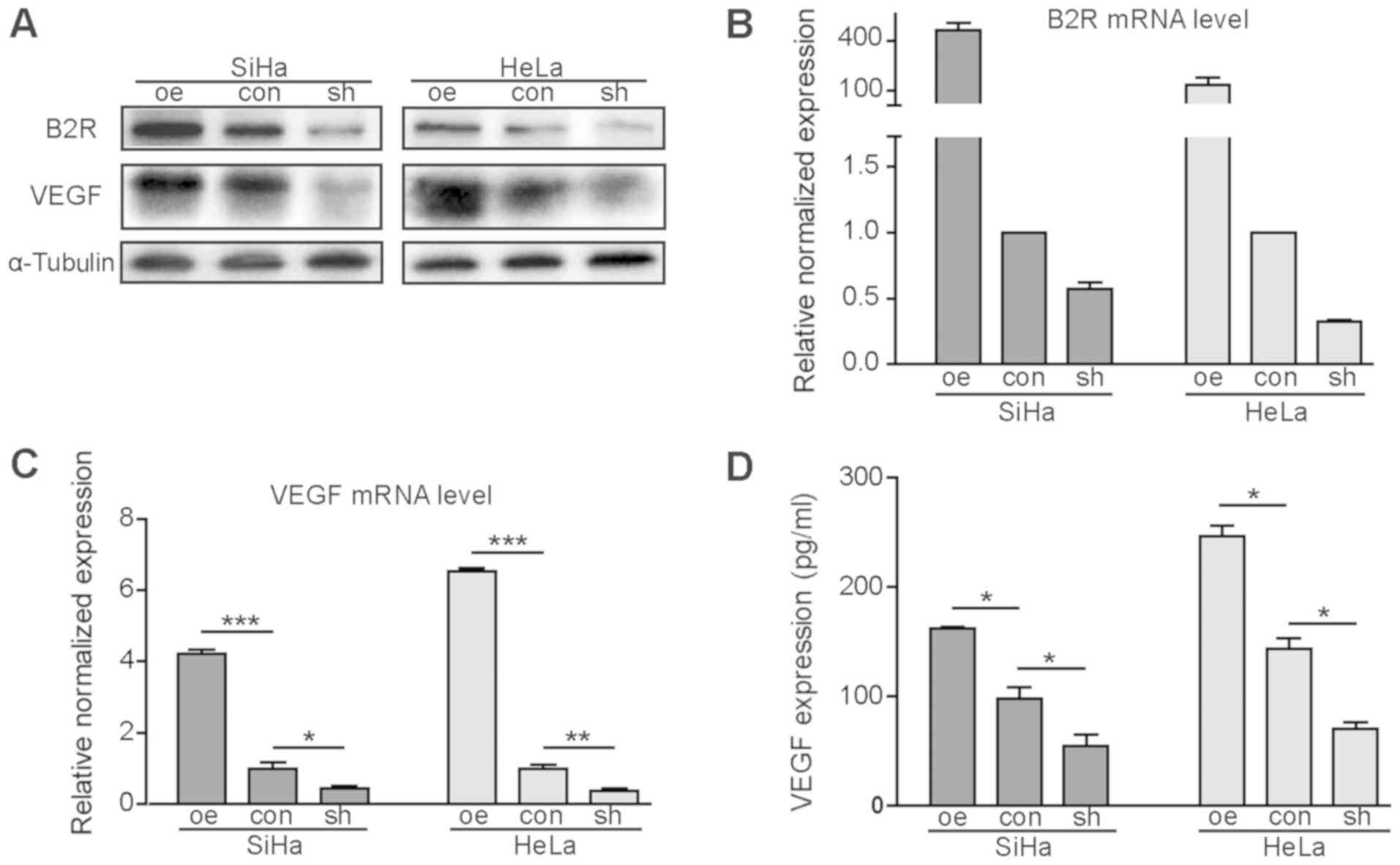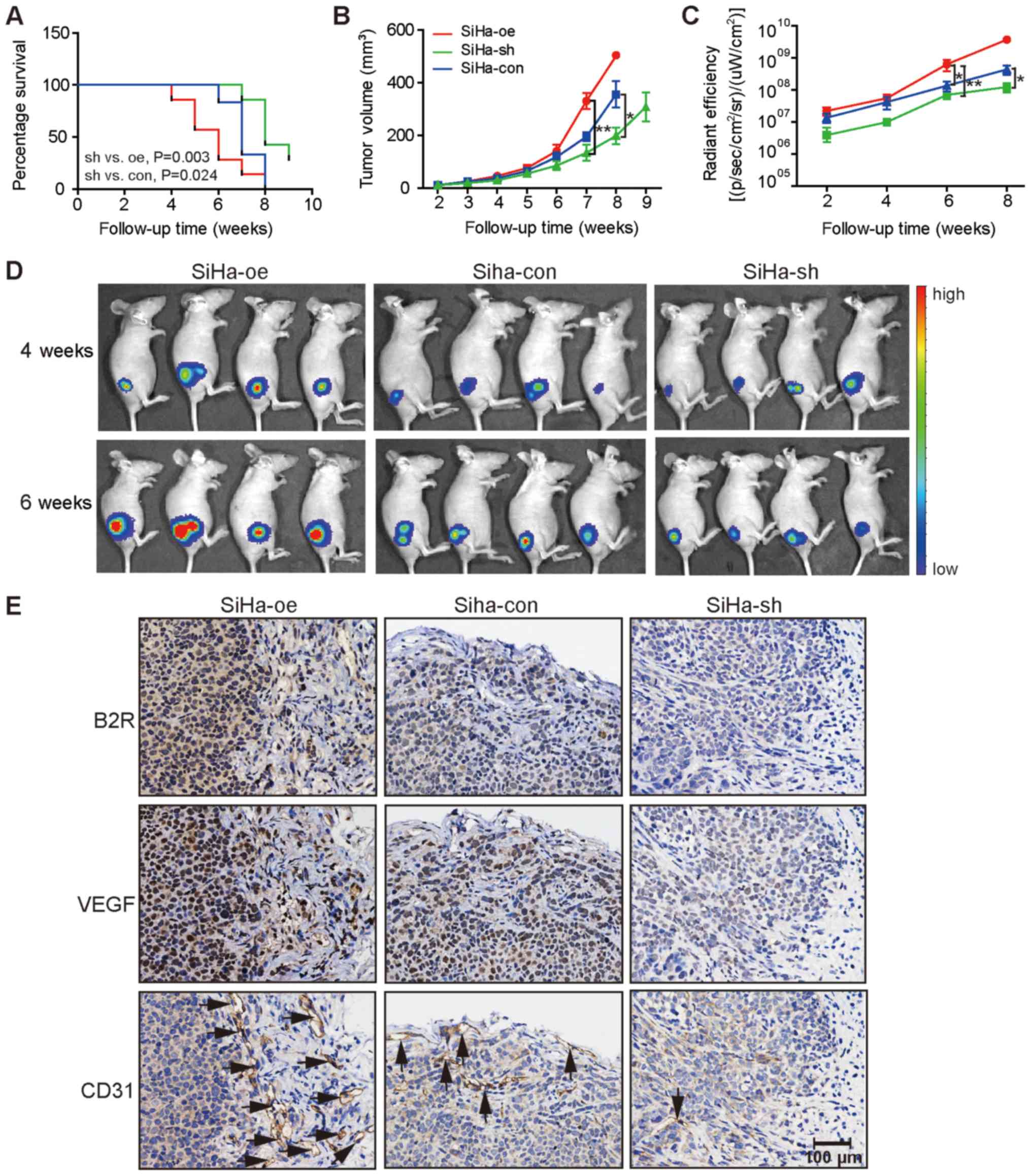|
1
|
Torre LA, Bray F, Siegel RL, Ferlay J,
Lortet-Tieulent J and Jemal A: Global cancer statistics, 2012. CA
Cancer J Clin. 65:87–108. 2015. View Article : Google Scholar : PubMed/NCBI
|
|
2
|
Chen W, Zheng R, Baade PD, Zhang S, Zeng
H, Bray F, Jemal A, Yu XQ and He J: Cancer statistics in China,
2015. CA Cancer J Clin. 66:115–132. 2016. View Article : Google Scholar : PubMed/NCBI
|
|
3
|
Koh WJ, Greer BE, Abu-Rustum NR, Apte SM,
Campos SM, Cho KR, Chu C, Cohn D, Crispens MA, Dorigo O, et al:
Cervical Cancer, Version 2.2015. J Natl Compr Canc Netw.
13:395–404; quiz 404. 2015. View Article : Google Scholar : PubMed/NCBI
|
|
4
|
Di J, Rutherford S and Chu C: Review of
the cervical cancer burden and population-based cervical cancer
screening in China. Asian Pac J Cancer Prev. 16:7401–7407. 2015.
View Article : Google Scholar : PubMed/NCBI
|
|
5
|
Ueda Y, Enomoto T and Kimura T, Miyatake
T, Yoshino K, Fujita M and Kimura T: Serum biomarkers for early
detection of gynecologic cancers. Cancers (Basel). 2:1312–1327.
2010. View Article : Google Scholar
|
|
6
|
Pectasides D, Economides N, Bourazanis J,
Pozadzizou P, Gogou L, Koutsiouba P and Athanassiou A: Squamous
cell carcinoma antigen, tumor-associated trypsin inhibitor, and
carcinoembryonic antigen for monitoring cervical cancer. Am J Clin
Oncol. 17:307–312. 1994. View Article : Google Scholar : PubMed/NCBI
|
|
7
|
Nam JH, Chang KC, Chambers JT, Schwartz PE
and Cole LA: Urinary gonadotropin fragment, a new tumor marker.
III. Use in cervical and vulvar cancers. Gynecol Oncol. 38:66–70.
1990. View Article : Google Scholar : PubMed/NCBI
|
|
8
|
da Costa PL, Sirois P, Tannock IF and
Chammas R: The role of kinin receptors in cancer and therapeutic
opportunities. Cancer Lett. 345:27–38. 2014. View Article : Google Scholar
|
|
9
|
Bhoola KD, Figueroa CD and Worthy K:
Bioregulation of kinins: Kallikreins, kininogens, and kininases.
Pharmacol Rev. 44:1–80. 1992.PubMed/NCBI
|
|
10
|
Villanueva J, Shaffer DR, Philip J,
Chaparro CA, Erdjument-Bromage H, Olshen AB, Fleisher M, Lilja H,
BrogiE Boyd J, et al: Differential exoprotease activities confer
tumor-specific serum peptidome patterns. J Clin Invest.
116:271–284. 2006. View
Article : Google Scholar : PubMed/NCBI
|
|
11
|
van Winden AW, van den Broek I, Gast MC,
Engwegen JY, Sparidans RW, van Dulken EJ, Depla AC, Cats A,
Schellens JH, Peeters PH, et al: Serum degradome markers for the
detection of breast cancer. J Proteome Res. 9:3781–3788. 2010.
View Article : Google Scholar : PubMed/NCBI
|
|
12
|
Ishihara K, Kamata M, Hayashi I, Yamashina
S and Majima M: Roles of bradykinin in vascular permeability and
angiogenesis in solid tumor. Int Immunopharmacol. 2:499–509. 2002.
View Article : Google Scholar : PubMed/NCBI
|
|
13
|
Ikeda Y, Hayashi I, Kamoshita E, Yamazaki
A, Endo H, Ishihara K, Yamashina S, Tsutsumi Y, Matsubara H and
Majima M: Host stromal bradykinin B2 receptor signaling facilitates
tumor-associated angiogenesis and tumor growth. Cancer Res.
64:5178–5185. 2004. View Article : Google Scholar : PubMed/NCBI
|
|
14
|
Yu HS, Wang SW, Chang AC, Tai HC, Yeh HI,
Lin YM and Tang CH: Bradykinin promotes vascular endothelial growth
factor expression and increases angiogenesis in human prostate
cancer cells. Biochem Pharmacol. 87:243–253. 2014. View Article : Google Scholar
|
|
15
|
Chen Y, Yu Y, Sun S, Wang Z, Liu P, Liu S
and Jiang J: Bradykinin promotes migration and invasion of
hepatocellular carcinoma cells through TRPM7 and MMP2. Exp Cell
Res. 349:68–76. 2016. View Article : Google Scholar : PubMed/NCBI
|
|
16
|
Andoh T, Akira A, Saiki I and Kuraishi Y:
Bradykinin increases the secretion and expression of endothelin-1
through kinin B2 receptors in melanoma cells. Peptides. 31:238–241.
2010. View Article : Google Scholar
|
|
17
|
Wang G, Sun J, Liu G, Fu Y and Zhang X:
Bradykinin promotes cell proliferation, migration, invasion, and
tumor growth of gastric cancer through ERK signaling pathway. J
Cell Biochem. 118:4444–4453. 2017. View Article : Google Scholar : PubMed/NCBI
|
|
18
|
Bechtold V, Beard P and Raj K: Human
papillomavirus type 16 E2 protein has no effect on transcription
from episomal viral DNA. J Virol. 77:2021–2028. 2003. View Article : Google Scholar : PubMed/NCBI
|
|
19
|
Hu Z, Ding W, Zhu D, Yu L, Jiang X, Wang
X, Zhang C, Wang L, Ji T, Liu D, et al: TALEN-mediated targeting of
HPV oncogenes ameliorates HPV-related cervical malignancy. J Clin
Invest. 125:425–436. 2015. View
Article : Google Scholar :
|
|
20
|
de Bruijn HW, Duk JM, van der Zee AG, Pras
E, Willemse PH, Boonstra H, Hollema H, Mourits MJ, de Vries EG and
Aalders JG: The clinical value of squamous cell carcinoma antigen
in cancer of the uterine cervix. Tumour Biol. 19:505–516. 1998.
View Article : Google Scholar : PubMed/NCBI
|
|
21
|
Bolger BS, Dabbas M, Lopes A and Monaghan
JM: Prognostic value of preoperative squamous cell carcinoma
antigen level in patients surgically treated for cervical
carcinoma. Gynecol Oncol. 65:309–313. 1997. View Article : Google Scholar : PubMed/NCBI
|
|
22
|
Folkman J: The role of angiogenesis in
tumor growth. Semin Cancer Biol. 3:65–71. 1992.PubMed/NCBI
|
|
23
|
McMahon G: VEGF receptor signaling in
tumor angiogenesis. Oncologist. 5(Suppl 1): 3–10. 2000. View Article : Google Scholar : PubMed/NCBI
|
|
24
|
Amini A, Masoumi Moghaddam S, Morris DL
and Pourgholami MH: The critical role of vascular endothelial
growth factor in tumor angiogenesis. Curr Cancer Drug Targets.
12:23–43. 2012. View Article : Google Scholar
|
|
25
|
Ulrich H, Ratajczak MZ, Schneider G,
Adinolfi E, Orioli E, Ferrazoli EG, Glaser T, Corrêa-Velloso J,
Martins PCM, Coutinho F, et al: Kinin and purine signaling
contributes to neuroblastoma metastasis. Front Pharmacol.
9:5002018. View Article : Google Scholar : PubMed/NCBI
|
|
26
|
Figueroa CD, Ehrenfeld P and Bhoola KD:
Kinin receptors as targets for cancer therapy. Expert Opin Ther
Targets. 16:299–312. 2012. View Article : Google Scholar : PubMed/NCBI
|
|
27
|
Wu J, Akaike T, Hayashida K, Miyamoto Y,
Nakagawa T, Miyakawa K, Müller-Esterl W and Maeda H: Identification
of bradykinin receptors in clinical cancer specimens and murine
tumor tissues. Int J Cancer. 98:29–35. 2002. View Article : Google Scholar : PubMed/NCBI
|
|
28
|
Dubuc C, Savard M, Bovenzi V, Lessard A,
Fortier A, Côté J, Neugebauer W, Rizzolio F, Geha S, Giordano A, et
al: Targeting intracellular B2 receptors using novel
cell-penetrating antagonists to arrest growth and induce apoptosis
in human triple-negative breast cancer. Oncotarget. 9:9885–9906.
2018. View Article : Google Scholar : PubMed/NCBI
|
|
29
|
Chan D, Gera L, Stewart J, Helfrich B,
Verella-Garcia M, Johnson G, Baron A, Yang J, Puck T and Bunn P Jr:
Bradykinin antagonist dimer, CU201, inhibits the growth of human
lung cancer cell lines by a 'biased agonist' mechanism. Proc Natl
Acad Sci USA. 99:4608–4613. 2002. View Article : Google Scholar
|
|
30
|
Chan DC, Gera L, Stewart JM, Helfrich B,
Zhao TL, Feng WY, Chan KK, Covey JM and Bunn PA Jr: Bradykinin
antagonist dimer, CU201, inhibits the growth of human lung cancer
cell lines in vitro and in vivo and produces synergistic growth
inhibition in combination with other antitumor agents. Clin Cancer
Res. 8:1280–1287. 2002.PubMed/NCBI
|
|
31
|
Lin KS, Pan J, Amouroux G, Turashvili G,
Mesak F, Hundal-Jabal N, Pourghiasian M, Lau J, Jenni S, Aparicio
S, et al: In vivo radioimaging of bradykinin receptor B1, a widely
overex-pressed molecule in human cancer. Cancer Res. 75:387–393.
2015. View Article : Google Scholar
|
|
32
|
Kuo HT, Pan J, Lau J, Zhang C, Zeisler J,
Colpo N, Bénard F and Lin KS: Radiolabeled R954 derivatives for
imaging bradykinin B1 receptor expression with positron emission
tomography. Mol Pharm. 14:821–829. 2017. View Article : Google Scholar : PubMed/NCBI
|
|
33
|
Amouroux G, Zhang Z, Pan J, Jenni S, Zhang
C, Hundal-Jabal N, Colpo N, Zeisler J, Lin KS and Bénard F:
Synthesis and evaluation of a 68Ga-labeled bradykinin B1 receptor
agonist for imaging with positron emission tomography. Bioorg Med
Chem. 25:690–696. 2017. View Article : Google Scholar
|
|
34
|
Dubuc C, Savard M, Bovenzi V, Lessard A,
Côté J, Neugebauer W, Geha S, Chemtob S and Gobeil F Jr: Antitumor
activity of cell-penetrant kinin B1 receptor antagonists in human
triple-negative breast cancer cells. J Cell Physiol. 234:2851–2865.
2019. View Article : Google Scholar
|
|
35
|
Kontos CK, Mavridis K, Talieri M and
Scorilas A: Kallikrein-related peptidases (KLKs) in
gastrointestinal cancer: Mechanistic and clinical aspects. Thromb
Haemost. 110:450–457. 2013. View Article : Google Scholar : PubMed/NCBI
|
|
36
|
Hong SK: Kallikreins as biomarkers for
prostate cancer. BioMed Res Int. 2014:5263412014. View Article : Google Scholar : PubMed/NCBI
|















